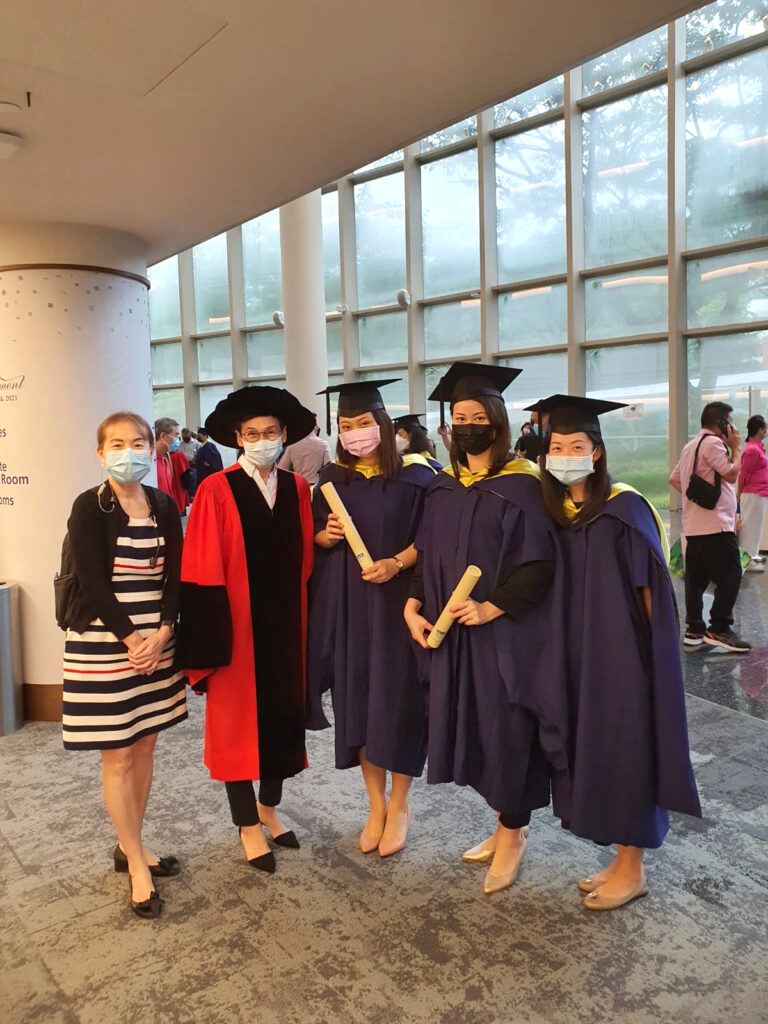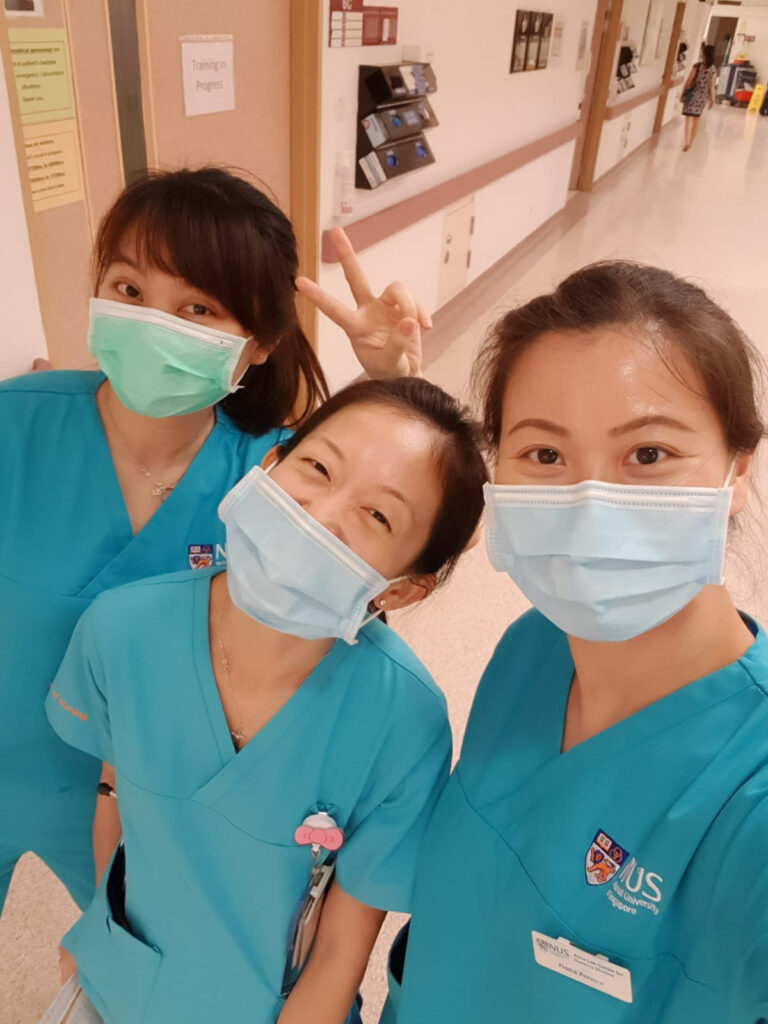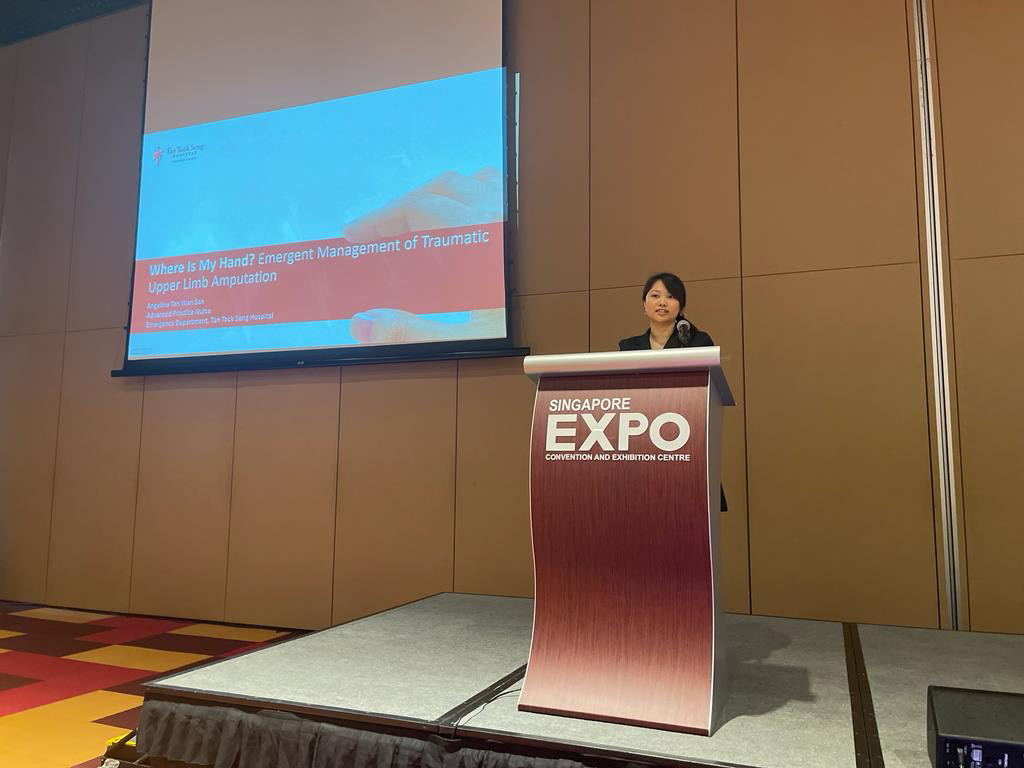
On 2 separate occasions, at different crossroads—Angeline Tan, an Advanced Practice Nurse (APN), took a leap of faith and made choices that shaped her life’s course, leading her to where she is now. The alumna of the Alice Lee Centre for Nursing Studies (NUS Nursing), National University of Singapore Yong Loo Lin School of Medicine reflects on her journey thus far.
“There are days and moments when I feel that I have earned my keep and a little more. But there are also days that are simply challenging. Still, I’ve never regretted my choices,” said Angeline with much conviction in her voice and eyes.

On choosing Nursing:
“I really liked that Nursing is a marriage of science and humanity.”
At 18, Angeline stood at her first major crossroads. After receiving her GCE A-Level results, she pondered about her career choices and naturally, her course of study. She said, “I am passionate about Chinese culture and literature, but there was also another side of me that wants to do work that can positively impact others—so I was seriously considering social work and counselling. In the end, despite not having any background in biology since my lower secondary school days, I took a leap of faith and chose Nursing.”
As it turned out, Angeline’s non-science background did pose some challenges for her. “Thankfully, I had a senior in the healthcare profession who helped me pull through the dark days of anatomy and physiology. Amid the struggles, however, I really enjoyed the hands-on aspect that Nursing offers. Although the clinical work could get quite technical, compassion and humanity are very much evident in each encounter,” Angeline shared.
On working at the Emergency Department:
“I wasn’t just bringing a life back, I am bringing a loved one back.”

Angeline joined the emergency department after graduating from NUS Nursing. She said, “It was a good fit for my personality—I like the pace, the quick decision-making, and the efficiency. There is a certain sense of routine each day, yet there is much dynamism. Every patient has a unique personality, presents different conditions, and responds differently to treatments.”
Working at the emergency department, Angeline was exposed to various aspects of clinical emergencies. Besides handling cases involving traffic accidents, pneumonia, cardiac arrests, which were frequent, she also learned disaster management, as well as infectious disease outbreak management. “Emergency physicians and nurses are often the first responders to these sudden events—we must be trained and prepared to attend to any of these arising situations. Demanding as it is, it is also what really made me love this discipline even more,” she explained.
Angeline’s passion for emergency medicine was forged in more ways than one—with one specific defining moment that she would always look back at to keep her going. “There are many moments during my Nursing career that made me feel that my time and energy are well-spent. But there was this incident when I was about 5 years into my career.
“An elderly man was sent in—and we had to revive him. We managed to do that successfully, but he was unstable and drowsy, so we sent him for a brain scan. The moment we pushed him out of the resuscitation room, his adult children, grandchildren and other relatives all trailed behind us and kept calling out for him to ‘hang on’. In that moment, it all became clear—the purpose, impact and true value of our work as nurses,” Angeline recalled.
On deciding to go with the Clinical Nursing Track:
“This is a big step—and should not be taken lightly.”
After 7 years of working, Angeline came to the second crossroads. She said, “I was enjoying my work—and relishing the opportunities to be involved in disaster management and infectious disease planning. But I also started to ask myself, ‘what’s next? Do I want to venture into administration and management, continue with my clinical work and step up, or try my hand at education and training?’”
Many rounds of discussions with consultants and senior nurses in her department later, Angeline decided to pursue the Clinical Nursing track. “Choosing to become an APN is a unique career path with a very steep learning curve. One needs to have an appetite to take on a significantly larger role. APNs are expected to assume roles akin to that of junior medical officers—and eventually even specialise as we gain experience. The transformation is not a gradual one. It is rigorous and calls for a lot of perseverance and commitment. Once decided, one shouldn’t think of leaving.”
Fortunately for Angeline, she has the support of her family, and her peers and managers at work, to further her studies. “My family is very supportive. They have always known that I will probably not stop at a Bachelor’s,” she smiled.
On returning to NUS Nursing:
“I was really looking forward to going back to NUS.”
Angeline enrolled in the Master of Nursing programme in January 2020. The period of her study coincided with the COVID-19 outbreak, and most lessons were carried out virtually. Angeline said, “I have so many fond memories from my NUS Nursing undergraduate days—so I was really looking forward to returning and seeing my lecturers, spending time in the library and bonding over food with my course mates. But COVID-19 happened.
“We had 1 month of physical lectures and tutorials—then we had to pivot to virtual classrooms. It was unexpected and a pity. We inevitably lost some of the richness of the interaction and opportunities for practice sessions. Nonetheless, we still had a very robust attachment schedule where we did rounds, and learned how to carry out examinations and tailor patient management plans.”
On being an APN:
“Patients confuse us for doctors.”
Upon completing her course, Angeline returned to the emergency department. Today, she divides her time at work between clinic days where she would be involved in patient consultations, and guiding junior nurses at work. Angeline said, “During my clinic days, I would see patients together with the medical team, take patients’ history, update relatives on the condition of their loved ones—including broaching difficult topics at times, assist in some advanced medical procedures, and reassess patients after starting a treatment for some time. Other days, I conduct a lot of training to impart my clinical knowledge to junior nurses.”
Beyond clinical knowledge, Angeline recognises that going through the Master of Nursing programme has also sharpened her soft skills. “With my enhanced knowledge, I am better able to teach and advise my nurses on how to anticipate and be better prepared in their care for patients. Correspondingly, they have become more open to discussing concerns with me and seeking me out for advice. Similarly, I enjoy more consultative and collaborative partnerships with the doctors now—initiating patient management plans or additional investigations.”
But there is one area that Angeline hopes to see improvements in for APNs. She elaborated, “I hope the public can give more recognition to APNs. Although we have the ability to explain patients’ conditions to them and their relatives as effectively as doctors, I still get the occasional question ‘is it because we are not sick or important enough—that’s why we see APNs instead of doctors?’ It really breaks my heart to hear this.
“Then there are also times when after a consult, patients will cheerfully bid me ‘thank you, doctor!’ This is despite me introducing myself as an APN at the beginning of the consult.”



